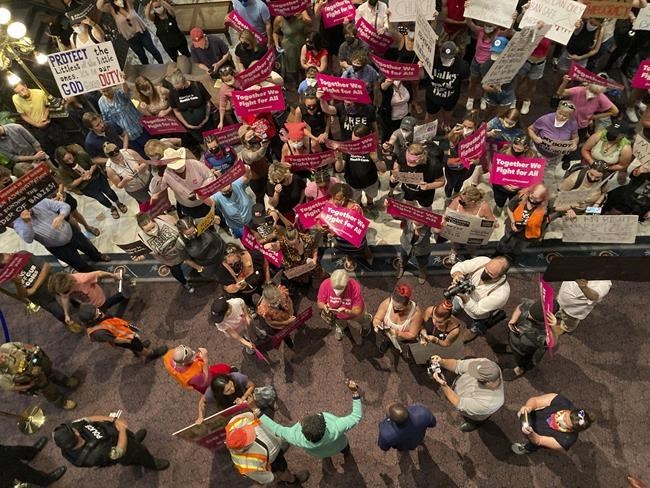NEW ORLEANS ŌĆö A federal court Tuesday allowed Tennessee to ban abortions as early as six weeks into pregnancy, while in Texas ŌĆö which is already enforcing a similar ban based on an embryo's cardiac activity ŌĆö a judge temporarily blocked an even stricter decades-old law from taking effect.
The moves were among a flurry of action at courthouses across the country after and ruled that terminating a pregnancy is not a constitutional right.
Statewide bans or other restrictions that were either left on the books for generations, tied up by legal challenges or specifically designed to take effect if Roe were to fall are now in play as a result of the high court's ruling. are expected to prohibit or severely limit the procedure now that the high court has left it up to them.
Since Friday, judges have agreed to allow bans or other restrictions to take effect in Alabama, Ohio, South Carolina and Tennessee. But abortion bans remained temporarily blocked in some states, including Louisiana. Decisions are pending in Florida and Indiana, while abortion rights advocates dropped some of their legal efforts in Minnesota and Missouri.
Some clinics initially turned patients away after the high court ruling, then reopened as judges ruled in their favor. That happened in Louisiana on Tuesday. In Texas, at least one abortion provider said it would reopen after Tuesday's ruling.
Texas already bans most abortions after about six weeks ŌĆö before many women know they are pregnant ŌĆö under a law that took effect in September and makes no exception in cases of rape or incest. But a judge in Houston, a Democratic city in a conservative state, blocked enforcement for now of an even stricter law that calls for a statewide ban on virtually all abortions.
That law has been on the books for decades but was nullified while Roe was in place. A separate, so-called trigger law that would prohibit virtually all abortions in Texas is set to take effect in coming months.
In Tennessee, the action by the 6th U.S. Circuit Court of Appeals on a six-week ban came ahead of a trigger law that's expected to further restrict abortion by mid-August, according to a legal interpretation by the state's attorney general. Both measures would make performing an abortion a felony and subject doctors to up to 15 years in prison.
opened the gates on a wave of litigation. One side is seeking to put statewide bans into effect swiftly, while the other is trying to stop or at least delay such measures.
Much of the court activity focused on trigger laws adopted in 13 states that were designed to take effect quickly upon Additional lawsuits also target old anti-abortion laws that were left on the books and went unenforced under Roe. Newer abortion restrictions that were put on hold pending the Supreme Court ruling are also coming back into play.
Wisconsin's Democratic attorney general filed a lawsuit Tuesday challenging a ban that has been on the books for 173 years. Abortion opponents argued it's now in effect, and abortion providers in the state have stopped offering the procedure. But Attorney General Josh Kaul said an abortion-friendly law passed in 1985 supersedes the older law.
In Mississippi, Jackson WomenŌĆÖs Health Organization filed a lawsuit Monday seeking to stay open, after the Republican attorney general published notice that the stateŌĆÖs trigger law would take effect in 10 days. Iowa Republican Gov. Kim Reynolds said Tuesday she would turn to the courts to try to end most abortions in the state.
Federal cases were dismissed in some states and may be refiled in state courts, where state constitutional issues will be raised. The dismissal of a case in Utah led lawmakers to say that a 2019 law banning abortion after 18 weeks of gestation would now go into effect. But Planned Parenthood called the dismissal a ŌĆ£procedural moveŌĆØ and said it could still challenge the ban. A day earlier, a judge blocked enforcement of a near-total ban on abortion for at least two weeks.
In some states, laws that would prosecute abortion doctors or facilitators are a target. An Arkansas prosecutor sent a letter to a Planned Parenthood facility on Tuesday warning about the penalties of the stateŌĆÖs abortion ban, even though the clinic hadn't been providing them before the law took effect. In Massachusetts, Democrats unveiled a bill echoing an executive order signed by the Republican governor that aims to protect abortion providers and individuals seeking abortions from actions taken by other states.
About 200 gathered inside the South Carolina Statehouse on Tuesday, a day after a federal court ruled that abortion restrictions could take effect immediately there. One woman, who was seen on videos yelling at police and putting her hands on an officer, was arrested and charged with misdemeanor assault.
Merritt Watts, another protester, told the AP she moved to South Carolina from California last year and if she still lived in California, she would have ŌĆ£completely different rights.ŌĆØ
ŌĆ£I used to think of red states as someone elseŌĆÖs problem, but itŌĆÖs not,ŌĆØ the Charleston resident said. ŌĆ£They deserve what Californians have.ŌĆØ
___
Forliti reported from Minneapolis and Mulvihill from Cherry Hill, New Jersey. Jamie Stengle contributed from Dallas. Other Associated Press writers across the U.S. also contributed.
___
For APŌĆÖs full coverage of the Supreme Court ruling on abortion, go to .
Amy Forliti And Geoff Mulvihill, The Associated Press


